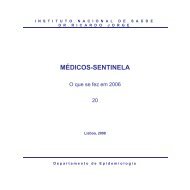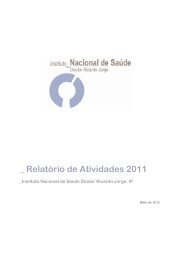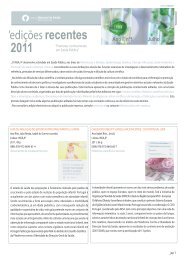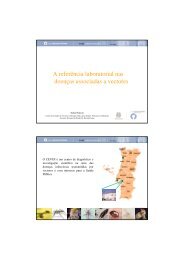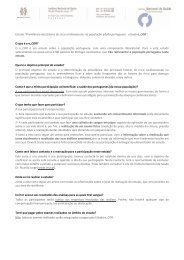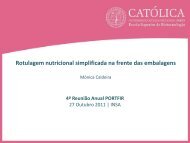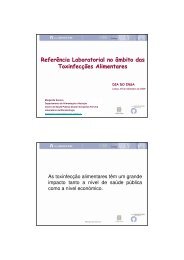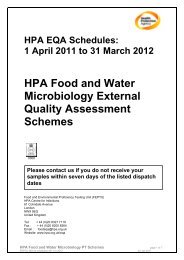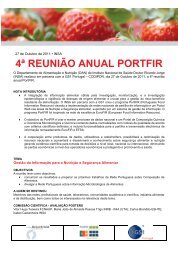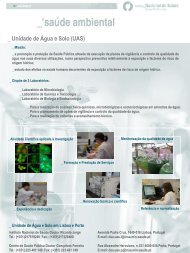European Society of Mycobacteriology - Instituto Nacional de Saúde ...
European Society of Mycobacteriology - Instituto Nacional de Saúde ...
European Society of Mycobacteriology - Instituto Nacional de Saúde ...
You also want an ePaper? Increase the reach of your titles
YUMPU automatically turns print PDFs into web optimized ePapers that Google loves.
SPOLIGOTYPING OF Mycobacterium tuberculosis ISOLATED FROM<br />
PATIENTS OF CLEMENTE FERREIRA AMBULATORY IN SÃO PAULO, SP – BRAZIL<br />
PP-17<br />
Mello, Fernado Augusto Fiuza 1 , Albarral, Maria I<strong>de</strong>mar Pedrosa 1 , Men<strong>de</strong>s, Natália Helena 2 , Pandolfi, José Rodrigo<br />
Cláudio 2 , Santos, Adolfo Carlos Barreto 2 , Almeida, Elisabete Aparecida 1 , Cardoso, Rosilene Fressatti 3 , Leite, Clarice<br />
Queico Fujimura 2<br />
1 - Clemente Ferreira Institute<br />
2 - São Paulo State University<br />
3 - Maringá State University<br />
The molecular epi<strong>de</strong>miology study using different techniques revolutionized the un<strong>de</strong>rstanding <strong>of</strong> the epi<strong>de</strong>miology<br />
<strong>of</strong> tuberculosis allowing comparison between strains <strong>of</strong> Mycobacterium tuberculosis and tracking the movement <strong>of</strong><br />
individual strains. This project aims to use the technique <strong>of</strong> molecular epi<strong>de</strong>miology, Spoligotyping, trying to un<strong>de</strong>rstand<br />
more about the phenomenon <strong>of</strong> transmission in patients with pulmonary tuberculosis treated at Clemente Ferreira<br />
Ambulatory (ambulatory <strong>of</strong> reference for the treatment <strong>of</strong> tuberculosis) in São Paulo city, from August 2006 to July 2008.<br />
The clinical isolates were re-i<strong>de</strong>ntified by molecular technique (PCR and PRA), and the strains i<strong>de</strong>ntified as M. tuberculosis<br />
conducted by the genotyping technique <strong>of</strong> Spoligotyping. From 102 isolates, the technique <strong>of</strong> IS 6110-PCR confirmed<br />
the i<strong>de</strong>ntification <strong>of</strong> M. tuberculosis in 96 clinical isolates and the PRA in 99, the remaining 3, 2 isolates i<strong>de</strong>ntified as M.<br />
avium subtype 2 and 1 uni<strong>de</strong>ntified mycobacteria. The results showed that 3 clinical isolates <strong>of</strong> M. tuberculosis had not<br />
the IS6110 insertion sequence specific <strong>of</strong> M. tuberculosis, as well as 3 isolates i<strong>de</strong>ntified in the clinic as M. tuberculosis<br />
by molecular techniques were atypical mycobacteria. Of 96 isolates confirmed as M. tuberculosis, were analyzed by the<br />
technique <strong>of</strong> Spoligotyping, a total <strong>of</strong> 89 isolates, which revealed the presence <strong>of</strong> 21 strains (23.6%) with spoligotipes not<br />
yet <strong>de</strong>scribed in the data base world (spolDB4) and 68 (76.4%) <strong>of</strong> isolates involved in 7 different families, containing 2 to<br />
30 isolates. The most frequent was T family with 30 isolates), followed by LAM (with 20 isolates) and Haarlem (with 10<br />
isolates), which together accounted about 67.4% <strong>of</strong> all isolates. Were also i<strong>de</strong>ntified 4 genotypes <strong>of</strong> the Beijing family, all<br />
simultaneously resistant to isoniazid and rifampicin and / or more drugs.<br />
<strong>European</strong> <strong>Society</strong> <strong>of</strong> <strong>Mycobacteriology</strong> | 30 th Annual Congress | July 2009 | Porto - Portugal<br />
89



